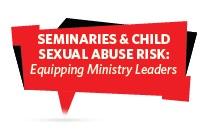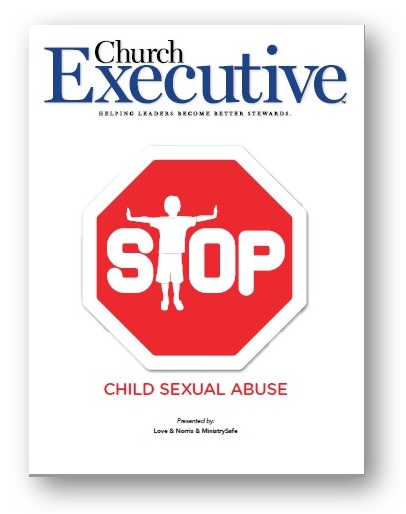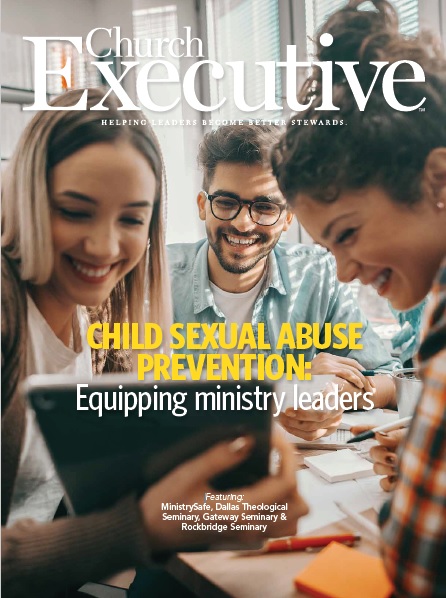
By Gregory Love & Kimberlee Norris
 SEXUAL ABUSE ALLEGATIONS continue to make headlines, and subsequent media coverage indicates that ministry leaders tend to be unprepared for child sexual abuse issues.
SEXUAL ABUSE ALLEGATIONS continue to make headlines, and subsequent media coverage indicates that ministry leaders tend to be unprepared for child sexual abuse issues.
Unfortunately, this lack of awareness is not unusual.
![]() Earlier articles in this series introduced topics that church leaders must understand and apply, if children are to be effectively protected from this known risk. (To access them all, download the Stop Sexual Abuse eBook.) This writing is intended to guide ministry leaders to current resources providing a more thorough coverage of the critical concepts introduced earlier in the series.
Earlier articles in this series introduced topics that church leaders must understand and apply, if children are to be effectively protected from this known risk. (To access them all, download the Stop Sexual Abuse eBook.) This writing is intended to guide ministry leaders to current resources providing a more thorough coverage of the critical concepts introduced earlier in the series.
As Christ-followers, attorneys and child sexual abuse experts, we created MinistrySafe to raise awareness and provide effective resources to prevent sexual abuse in ministry contexts. We believe it’s imperative that ministry leaders better understand sexual abuse in order to prevent it, properly respond to it, and provide appropriate care for abuse survivors.
How can future ministry leaders and current staff members be equipped to meet this need?
Christ-based seminaries provide one logical avenue — academic institutions committed to equipping future ministry leaders to navigate environmental challenges, while pursuing a biblical mission. Without doubt, the issue of child sexual abuse is one of these challenges. Seminaries have begun to address this issue by offering or requiring relevant training and coursework.

Some seminaries have focused on curriculum and training regarding awareness and prevention; others have focused on counseling, emotional care and support. Some have focused
on both.
This article attempts to highlight the efforts of various seminaries committed to equipping students and alumni with timely, effective training and resources aimed at sexual abuse prevention and healing.
Seminary coursework
As early as 2004, we began teaching in seminaries around the country. Many of these teaching opportunities were one or more class sessions within a course (i.e., Church Administration, Youth Ministry, Children’s Ministry, Church Development). With this time limitation, only a basic introduction of the risk was possible, convincing seminary students (and faculty) that child sexual abuse is real, relevant in Christ-based environments, and not merely a ‘Catholic problem’. Students needed more.
 Seminary Solutions — MinistrySafe Institute
Seminary Solutions — MinistrySafe Institute
To provide a more comprehensive evaluation of sexual abuse risk, MinistrySafe and Dallas Theological Seminary collaborated to create the first 3-hour graduate-level course — “Preventing Sexual Abuse in the Church” — offered every Spring semester since 2017. The course includes more than 16 hours of pre-recorded content, provided through Canvas in seven modules, including:
• Understanding Sexual Abuse Risk in Ministry Contexts
• Creating an Effective Safety System
• Skillful Screening Processes and Training™
• Abuse Reporting Requirements
• Allegations — Preparation and Response Plans
• Legislation Related to Sexual Abuse / Changes in the Law
• A Model of Care for Abuse Survivors
The training content forming the basis of this course is now available through MinistrySafe Institute, or MSI [ministrysafeinstitute.com]. MSI materials may be integrated into academic environments as a standalone course or used within an existing course.
From a technical standpoint, MSI provides a Learning Tools Interoperability (LTI)-Compliant Tool easily delivered through LTI-Compliant Platforms (i.e., Canvas, Moodle, Blackboard, and so on).
In addition, MSI is available to current ministry staff members through the MinistrySafe control panel (for MinistrySafe members) or independently at MinistrySafeInstitute.com.
AWARENESS AND PREVENTION
Dallas Theological Seminary: first in class

In 2015, Dallas Theological Seminary (DTS) was the first to recognize the need for a comprehensive course specifically targeting child sexual abuse risk.
After various class sessions and trainings, Dean (now president) Mark Yarbrough and President (now Chancellor) Dr. Mark Bailey recognized a need to effectively equip students and faculty with sexual abuse awareness and training. DTS leaders believed that every student — regardless of degree plan — should have a basic understanding of sexual abuse risk, regardless of subsequent ministry position (whether missions, counseling, children’s ministry or administration).
By Fall 2015, DTS required every student to complete Sexual Abuse Awareness Training.
In Spring 2017, DTS offered a comprehensive 3-hour credit course limited to sexual abuse prevention and risk arising in ministry contexts. Offered each Spring since 2017, the course includes more than 16 hours of pre-recorded lecture content from sexual abuse experts, including preventative protocols, effective screening practices, child protection policy provisions and an appropriate model of care for abuse survivors.
DTS is an example of a seminary embracing the challenge of confronting child sexual abuse risk and appropriate response; others have risen to the challenge, as well.
Southern Seminary: raising the bar
While DTS was the first to create a dedicated course, Southern Baptist Theological Seminary (SBTS), the largest seminary in the United States, quickly followed suit with initiatives of its own.
Recognizing the need to provide training and instruction confronting sexual abuse risk, SBTS leaders created a requirement that every Southern student — regardless of degree plan — must complete Sexual Abuse Awareness Training. Southern sought to instill the value of abuse prevention in its students early, beginning at new student orientation.
In addition, every faculty and staff member is required to complete Sexual Abuse Awareness Training. Leading the way, SBTS President Dr. Albert Mohler was the first to
complete training.
Furthermore, Southern pursued additional training to equip students to minister to abuse survivors, offering both extracurricular and curricular training. In 2018, Southern dedicated its Counsel the Word conference to child sexual abuse prevention and care for abuse survivors. The conference equipped and discussed healing strategies. In the Equip program, guest speaker Ellen Dykas provided guidance in strategies for provision of care for abuse survivors. Additionally, a dedicated course addressing crisis and trauma counseling was added to Southern’s requirements for an M.A. in
Biblical Counseling.
Seminaries: a growing response
With campuses in five states, a Global Campus and three extensions, Reformed Theological Seminary requires that all faculty, staff and students complete Sexual Abuse Awareness Training upon hire or before graduation.
As the first to complete training, RTS Chancellor and CEO Dr. Ligon Duncan lead by example, saying, “As shepherds we must be up to speed on this issue as we guard the flock. We must be faithful to this part of our calling.”
In 2018, Rockbridge Seminary began offering Sexual Abuse Awareness Training to all staff, faculty, board of trustee members, advisory council members and students. Rockbridge alumni provide financial support for these child protection initiatives.
Bob Jones University (BJU) and Bob Jones Seminary were the first academic institutions to require campus-wide Sexual Abuse Awareness Training. Beginning in Fall 2014, BJU has required all students, faculty and staff to attend live, on-campus Awareness Training provided by myself (Greg Love, founder and Director of MinistrySafe).
Midwestern Baptist Theological Seminary requires all faculty and staff to complete Sexual Abuse Awareness Training, as well as all incoming students.
Gateway Seminary and New Orleans Baptist Theological Seminary require all students and faculty to complete Sexual Abuse Awareness Training.
Dallas Baptist University requires all graduate-level students to complete MinistrySafe Institute, comprehensive online coursework, prior to graduation. See sidebar
Liberty School of Divinity requires completion of MinistrySafe Institute coursework by students pursuing specific degree plans.
In March 2020, Denver Seminary hosted and promoted Sexual Abuse Awareness Training for its students, faculty and local churches, focused on child sexual abuse prevention. Unfortunately, a worldwide pandemic intervened, postponing the event.
Each of the academic institutions referenced above use MinistrySafe training resources.
Prevention, Healing and Caring
Awareness of the prevalence and impact of child sexual abuse is a starting point, because awareness facilitates prevention — the first step in reducing the toll of those experiencing the devastating impact of sexual abuse.
For millions, however, the horse is out of the barn; it’s too late to prevent the experience. Conservative studies indicate that 1 in 5 Americans has endured sexual victimization as a child. This reality demands attention in the form of understanding, compassion, empathy and healing.
Most Bible-believing theologians believe the Bible is an amazing tool of healing — sharper than any two-edged sword — akin to a scalpel. This is accurate, but the scalpel can do great damage when wielded by a physician unfamiliar with the underlying medical issue. Many churches and ministry leaders are rightly criticized for using scripture in an unskilled manner, often compounding existing wounds. The church and Christian ministries need skilled instruction to better navigate its response to child sexual abuse allegations and provision of care.
As sexual abuse attorneys, we have spoken to thousands of sexual abuse survivors — providing representation to many. Experience and compassion go a long way to facilitate healing. But an attorney’s background, education and experience provide no substitute for effective counseling and pastoral care.
The Church is called to provide the Balm of Gilead, and trained Christian counselors and pastors serve as chief instruments for providing this care and counsel. Skillful counsel and pastoral care in this realm are not intuitive, and few churches do this well without good instruction.
Our seminaries must equip students to serve as such a balm, and many seminaries have embraced the need to provide instruction, curriculum, conferences and learning opportunities for students, pastors and lay leaders.
Kimberlee Norris & Gregory Love are partners in the Fort Worth, Texas law firm of Love & Norris and founders of MinistrySafe, providing child sexual abuse expertise to ministries worldwide. After representing victims of child sexual abuse for more than two decades, Love and Norris saw recurring, predictable patterns in predatory behavior. MinistrySafe grew out of their desire to place proactive tools into the hands of ministry professionals.
Love and Norris teach the only graduate-level course on Preventing Sexual Abuse in Ministry as Visiting Faculty at Dallas Theological Seminary.
Thought leaders speak out
The challenges in Christian ministry are many; few are more important than properly addressing child sexual abuse risk. At Reformed Theological Seminary, we’ve made it a priority to equip future ministry leaders with the Bible and theology, as well as practical pastoral preparation, in order to reach and disciple a broken world. To that end, we are committed to creating and maintaining safe environments for children in the church, as well as healthy environments for abuse survivors. We appreciate the expertise and experience of Kimberlee Norris and her tireless efforts to protect children in the church through her work at MinistrySafe.
Dr. Ligon Duncan
Chancellor and CEO
Reformed Theological Seminary
John E. Richards Professor of Systematic and
Historical Theology
At Dallas Theological Seminary, we are committed to equipping our students with excellent resources to address real-life needs in vocational ministry. To that end, we require ALL students to complete MinistrySafe training before enrolling for seminary coursework.
In addition, we’ve partnered with Gregory Love and Kimberlee Norris, DTS Visiting Faculty and founders of MinistrySafe, to offer a three-hour credit course addressing child sexual abuse in ministry contexts: the first of its kind. We’ve made this commitment because we believe it is our responsibility to equip future ministry leaders to better understand and address child sexual abuse. Ministry leaders cannot address a risk that they don’t understand — we are working to create and foster that understanding.
Dr. Mark Yarbrough
President
Dallas Theological Seminary
Awareness and prevention are paramount, but the existing impact of abuse on countless men and women is no less significant. At Southern, we have committed extraordinary resources to address the devastating impact of sexual abuse on individuals and families.
What I deeply appreciate about Gregory Love and Kimberlee Norris is that they go to war the right way. Instead of shooting in every direction or sounding the alarm without clear direction, they patiently and wisely train individuals to identify each threat and to work effectively to protect those who are vulnerable. MinistrySafe has strongly facilitated our effort to train students to stand against abuse in the name of the Lord.
Dr. Jeremy Pierre
Chair — Department of Biblical Counseling
Southern Baptist Theological Seminary
At Liberty University, we are committed to our founding vision of Training Champions for Christ. The School of Divinity supports that vision by coming alongside the local church in its quest to fulfill the Great Commission, which demands a focused awareness of modern ministry requirements. Every ministry leader today must model and lead God’s people by establishing the safest practices and protecting past and potential victims of sexual abuse. The Rawlings School of Divinity has leaned on MinistrySafe to train our students to that end. Gregory Love and Kimberlee Norris bring a wealth of experience to the table. Their expertise, concern for abuse survivors, and love for the church make them invaluable partners in curriculum creation that equips our students to shepherd and protect the flock.
Dr. Troy W. Temple
John W. Rawlings School of Divinity, Dean
Liberty University
In 2018, Rockbridge began requiring all students to complete Sexual Abuse Awareness Training provided by MinistrySafe. In our current cultural climate, every ministry leader must have a basic understanding of child sexual abuse risk and prevention. Sexual abuse of children in the church is not limited to one denomination or country. Our international students have expressed appreciation that we have chosen to address this cultural issue clouded in secrecy in their country of origin. As an example, one student from Nigeria said this training prepared him to take proactive precautionary measures to prevent child sexual abuse occurring in his home country.
In addition, Rockbridge has also made this training available to our alumni, staff, faculty and board of trustees. Our faculty, all ministry practitioners, immediately endorsed the inclusion of the training into our curriculum. Our alumni, convinced of the training’s worth, contributed funds enabling us to provide the training to our entire seminary family.
We heartily encourage other seminaries to adopt this training into curriculum.
Daryl Eldridge, Ph.D.
President Emeritus and Cofounder
Rockbridge Seminary
Gateway Seminary continues to address sexual abuse issues in our curriculum by offering additional training opportunities, monitoring enforcement of internal policies, and providing counseling to affected individuals. Confronting these issues in the church requires leaders equipped for the challenge. Gateway Seminary shapes leaders who expand God’s kingdom around the world.
Dr. Jeff Iorg
President
Gateway Seminary of the Southern Baptist Convention
Midwestern Baptist Theological Seminary lives out its mission of being For the Church by training God-called men and women for ministry. Training that equips these leaders for the realities of our broken world must address child sexual abuse. MinistrySafe is a trusted partner in training our students, faculty and staff to better protect the congregations where they serve.
This has been an extremely helpful resource!
Dr. John Mark Yeats
VP Student Services, Dean of Students
Midwestern Baptist Theological Seminary
MinistrySafe provides a key element of our overall program to train future church and ministry leaders to protect the most vulnerable in their congregations and to care well for those affected by abuse. This training, required for incoming students, builds a solid base of knowledge that students take into their seminary course work and into their churches. We have really been pleased with this tool.
Craig Garrett, PhD, LCP-S
Dean of Students/AVP for Student Affairs
New Orleans Baptist Theological Seminary
It is hardly possible to over-emphasize the importance of protecting children in our churches and ministries. To that end, BJU Seminary seeks to train pastors, Christian leaders, missionaries and biblical counselors in awareness and prevention of child sexual abuse. Hosting live MinistrySafe trainings each year since 2015, Bob Jones University was one of the first universities to require that all students, faculty and staff members complete Sexual Abuse Awareness Training. We believe we have a responsibility to equip future leaders to recognize and respond appropriately to this grave and growing problem.
In an attempt to equip local ministries, BJU hosted pastors and church leaders in child protection training. As a result, many require child-serving staff members and volunteers to complete MinistrySafe training as a condition of service. Recently, BJU Seminary hosted a conference entitled, “Sexual Abuse and the Church,” including training modules on this topic. Our desire is that every student who will serve in ministry receives the necessary training to navigate this issue well.
Dr. Neal Cushman
Dean
Bob Jones University Seminary


